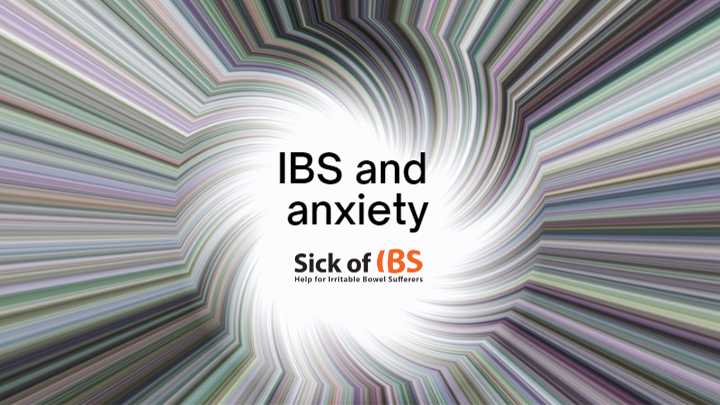
IBS with anxiety is unfortunately very common. Many IBS sufferers deal with anxiety at one level or another. If you didn’t feel anxious before, you can develop anxiety from IBS and trying to deal with all the symptoms.
Why is this, and what may be going on behind the scenes with your IBS?
IBS with anxiety
According to the NHS, anxiety is “a feeling of unease, such as worry or fear, that can be mild or severe.”
Anxiety can set off your first IBS flare, and fuel your IBS symptoms.
Can IBS cause anxiety too? Yes. Anxiety can be created actually dealing with IBS and its challenging symptoms.
Either way, there is a link. This study demonstrated a correlation between higher anxiety and more severe cases of IBS.
What causes anxiety?
I often work with people who have an ongoing, underlying sense of unease in their lives. Or live in a hypervigilant state.
They don’t know why, or if they do, they do not know how to change that experience.
One cause of anxiety (that is often overlooked) is past trauma. Even if you are convinced that you HAVEN’T experienced trauma, read on anyway. This could be exactly what you need to hear:
Trauma? What trauma?

We often think of trauma as being a huge, dramatic event.
But you don’t have to have lived in a war zone to have experienced trauma.
I missed one of my biggest IBS triggers because it didn’t seem significant enough.
It is easy to overlook these difficult episodes that don’t seem “that bad”.
But they were significant to YOU. And that’s all that counts.
The thing with trauma is this. We often blank it out. Or minimise it. Our clever minds protect us in this way.
We may have heard that we lived a certain event, but we can’t remember any details of it at all. There will be no real memories and therefore little emotion at all about it.
Yet, we keep running into the same situations, again and again, that trigger anxiety, and IBS.
You may not see the link – but there is one!
If you have blanked out, or minimised an event, it is worth considering that this might well be a central IBS trigger – and get help finding and releasing it.
Soft trauma

Soft trauma is the label given to a situation we live over a period of time and that we, and our nervous system, react to.
This may have been something we lived as a child and that was just part of “how it was” that we don’t even notice as being a trigger.
But when you run into a reminder of that trauma again, you just know that you don’t feel good. AND you’ll probably have an IBS flare-up to follow.
Soft trauma can turn up in difficulties as an adult too. It often turns up in your relationships and at work. If you see patterns in your life around work and relationships, and feel bad or anxious around the same kind of situation, or person, you have your finger on a trigger.
Panic attacks
Some people experience debiliatating panic attacks. I go further into IBS and anxiety attacks here. Again, trauma is often to be found behind panic attacks.
Accidents and past surgery
Accidents and past surgery (especially as a child) are not often mentioned related to IBS and anxiety. However, in my own experience as well as in coaching IBS sufferers, I have discovered first-hand just how much accidents and past surgery, especially as a child, often contain trauma.
Those times you had to grit your teeth and get through a bad situation? You probably don’t remember much about it – but your body does!
I had an accident when I was 5.
On holiday I slipped and I somehow did the splits on the side of the swimming pool.
I was whisked away to emergency and had stiches along my private parts.
I had blanked out everything – I just remember it being really painful to go to the toilet afterwards.

It was in the past, so it wasn’t a big deal for me – UNTIL I had children.
I didn’t realise it (I had never experienced labour before) but I had extreme anxiety about what I felt strongly as gynaelogical interference.
Yet it was just a medical team doing their best to help me during delivery.
In the end I had to be strapped down and have a cesaerian – which just heightened my anxiety and IBS – and the pain response in my body that lasted many months.
I didn’t see the link – at all.
Years later when going for a gynaelogical check-up I noticed how my feet in the stirrups and my hands were tightly clenched. I knew how to release trauma (one of my NLP specialisations) and did that for myself. The difference I felt in myself was incredible.
Accidents and surgery as a child have the potential of leaving trauma (and anxiety) behind.
Do you experience IBS with anxiety?
If anxiety and IBS are prominent in your life, you may sense that you are triggered – even if you’re not completely sure of what that is about.
You can try to push this aside and forget about it. But it will still be running in the background every day. Making you feel bad and sapping your confidence.
You will keep hitting situations that trigger your IBS – until you acknowledge those deep triggers and let the emotions out.
That’s how I reversed my IBS. Completely.
5